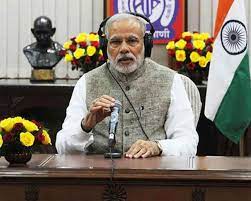Decoding the scripts of ‘Mann Ki Baat’
The focus areas of ‘Mann Ki Baat’ have been water and health. These are the two main areas which the Government is taking up on priority
India's flagship citizen outreach program, ‘Mann ki Baat’, represented by the Prime Minister of the country, has completed a century of broadcasts. It's time to take stock of the program's impact and priorities, by analysing the themes and focus areas across the 100 scripts. This analysis backed up by the data mining techniques reveals important insights into the government's communication strategy, the key issues it prioritizes, and the areas where it could focus more. One of the distinctive features of Mann ki Baat is the use of communication as a powerful tool to reach out to millions of people across India.
The program has leveraged social media and other platforms to amplify its outreach, using hashtags like #drugsfreeIndia, #YesWeCan, #IncredibleIndia, #armedforcesflagday, #PositiveIndia, #Jalshakti4India, #CourageinKargil, #Cheer4India and #MyHandloomMyPride among others to engage with the community. While observing it appeared that certain hashtags campaigns had bi-annual frequency, with a gap of around two years between most of them. This approach has been effective in raising awareness about important issues and generating public interest in the program.
A closer look at the 100 scripts reveals the key focus areas of the program. ‘Water’ and ‘Health’ are among the most frequently mentioned topics with a mention of 454, and 274 times respectively, indicating the government's focus on addressing these critical issues. During these conversations, there has been obvious discussion on the healthcare sector, doctors, workers and the pandemic era and these keywords have been found to be inadequate frequency.
Digital and online initiatives, such as MyGov, are also prominently featured, highlighting the government's push for digital transformation and innovation and the same can be observed in the nation’s journey towards technological developments in the past decade. However, topics such as ‘Climate change’, ‘Food’, and ‘Poverty’ receive comparatively less attention in the scripts, suggesting the need for greater focus on these issues.
The cultural heritage of the country, the importance of Yoga and ancient science were also important topics communicated during these conversations. Another interesting finding of the analysis is the geographical distribution of attention across states and regions. While Kashmir, Gujarat, Delhi, and Tamil Nadu have garnered more attention than others, BIMARU states (Bihar, Madhya Pradesh, Rajasthan, and Uttar Pradesh) have got comparatively less mention in these talks. The mention of Kashmir is also related to the fact that there were many governance and structural changes here which kept its discussion at a higher frequency.
It is quite interesting that the mentions of Leh-Ladakh and North East states are limited to 20 times or less. Only Assam state could receive significant mention among North Eastern Regions (NERs). This distribution highlights the need to focus more on certain regions and communities, especially those that are more marginalized. The use of certain keywords also reveals the government's priorities and approach. Words like ‘Rural’, ‘Village’, ‘Youth’, ‘Farmer’, and ‘Women’ are frequently mentioned, indicating the government's focus on empowering these communities.
This communication series not only engaged in dialogue but also drew wisdom from the legacies of notable figures in our country's history. Among the most frequently referenced were Mahatma Gandhi, Baba Saheb Ambedkar, and Buddha, with 92, 50, and 39 mentions respectively.
The analysis of Mann ki Baat's all 100 scripts highlights the program's strengths and limitations and provides important insights for policymakers and researchers. The program's focus on communication and outreach has been effective in engaging with the community and raising awareness about important issues. The use of hashtags and social media platforms has amplified the program's reach and impact, making it a powerful tool for citizen engagement. At the same time, the analysis highlights the need for greater focus on certain issues and communities. Topics like climate change, poverty, jobs and marginalized community receive comparatively less attention in the scripts, suggesting the need for greater emphasis on these issues.
Similarly, the geographical distribution of attention highlights the need to focus more on certain regions and communities. The global stand of India and its contribution was also observed to be one of the important highlighters in these talks and words like ‘United Nations’, ‘America’, and ‘Europe’ were observed to be in the frequency of 32, 50 and 15 respectively.
Finally, the analysis of Mann ki Baat's total 100 scripts provides a valuable perspective on the government's priorities and approach to citizen outreach. By leveraging communication as a powerful tool and focusing on key issues like water, health, and digital transformation, the program has made significant contributions to public awareness and engagement.
